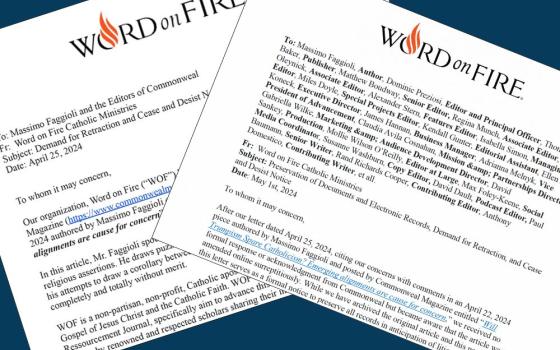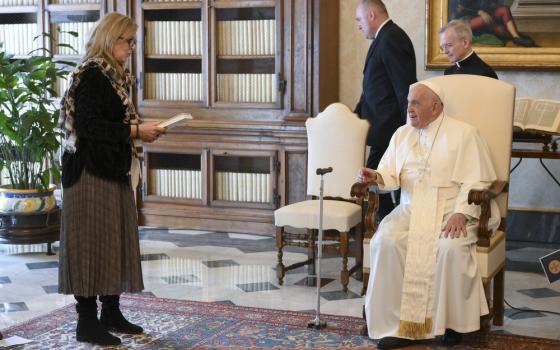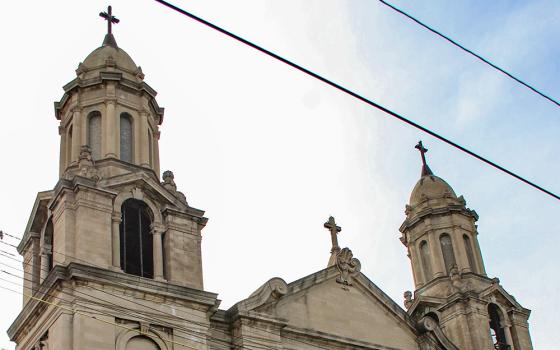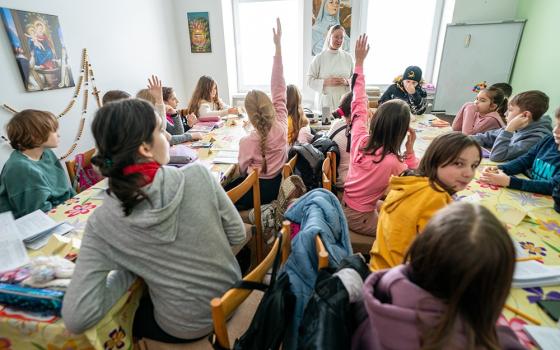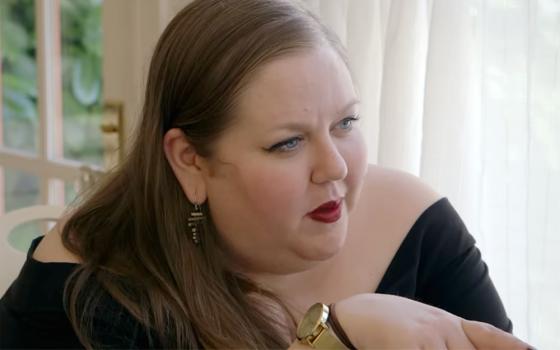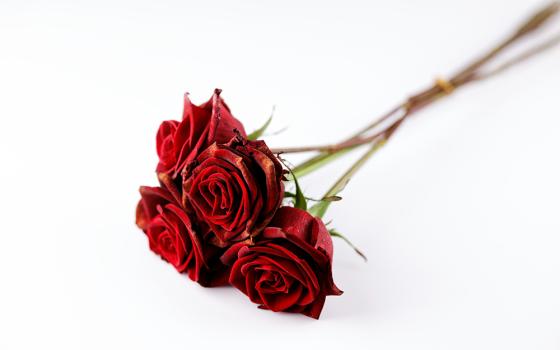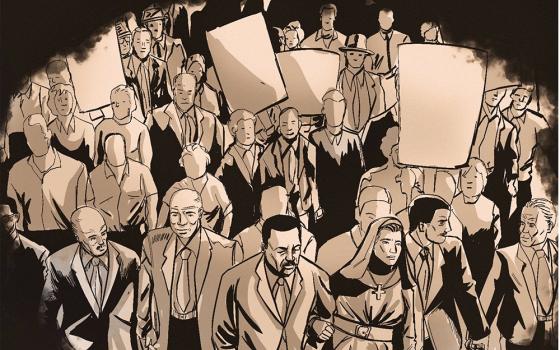A service member with the Ukrainian armed forces walks past combat positions near a line of separation from Russian-backed rebels near Horlivka in the Donetsk region of Ukraine Jan. 22. (CNS/Reuters/Anna Kudriavtseva)
The Holy Father called for a day of prayer for peace in Ukraine on Jan. 26. At the conclusion of his general audience that day, he voiced the hope that the prayers would reach heaven and "touch the minds and hearts of world leaders, so that dialogue may prevail and the common good be placed ahead of partisan interests."
The pope asked that we all pray the Our Father because "it is the prayer of sons and daughters to the one Father, the prayer that makes us brothers and sisters, the prayer of children who plead for reconciliation and concord."
As I write, we do not know if our prayers have been heard or if they had their desired effect. I confess I also made my own the words of Exodus 23:27 — "I will send my terror ahead of you and throw into confusion all the people against whom you will come" – and prayed that confusion would visit Russian President Vladimir Putin.
It is important to recognize that Putin does not want peace the way we want peace, that he doesn't even mean the same thing by peace as we do. Which is why those policymakers and commentators who think the West should proactively promise not to let Ukraine join NATO, or some similar act of appeasement, as a means of forestalling conflict, misunderstand the stakes for which Putin is playing or the motives that lead him to place 100,000 troops at the Ukrainian border in the first place.
As former U.S. ambassador to Russia Michael McFaul argued this week in the The Washington Post:
Not without reason, Putin believes that U.S. support for democracy abroad threatens his autocratic rule. During Putin's reign, most crises in relations with the United States have been triggered not by NATO expansion, but by democratic mobilizations — Putin calls them "color revolutions" — within countries, be it Georgia in 2003, Ukraine in 2004, the Arab Spring in 2011, Russia in 2011 and Ukraine in 2014.
There is no reason we cannot seek peace with an autocrat but, as McFaul points out, "U.S. leaders cannot command other societies to stop wanting democracy." Putin sees pro-democracy leaders governing in the parliament in Kyiv and he has nightmares of pro-democracy protests in the streets of Moscow.
To cite a nearby recent example, we in the West were horrified when authorities in Belarus forced a Rynair plane bound for Vilnius, Lithuania, to land at Minsk last summer so the regime of dictator Alexander Lukashenko could arrest journalist Roman Protasevich and his girlfriend. The incident caused nightmares for air traffic controllers around the world, who feared other dictators might try the same stunt. Putin no doubt slept more soundly that night, knowing a pro-democracy journalist agitating for change in a former Soviet republic was in jail.
Earlier leaders of Russia also viewed the world far differently from the way we do. Stalin, the most brutal ruler in Russian history, whose forced collectivization of farms led to mass starvation in Ukraine, became our ally in World War II. The U.S. negotiated important treaties with several Soviet leaders. Of course, when President Ronald Reagan negotiated with Mikhail Gorbachev, he did not have a major news network anchor essentially taking Gorbachev's side as Fox News' Tucker Carlson now voices support for Putin. Kremlin TV even said Carlson may have gone too far!
Russia knows that its vast reserves of oil and natural gas might be losing their value as European nations embrace sustainable forms of energy. But Europe is not there yet, and they remain very dependent on fossil fuel from Russia. That makes the mostly united front Biden has been able to coax out of NATO all the more impressive. Germany, the leading nation in the European Union, has been reluctant to take a lead in security matters similar to the one it easily takes in economic ones.
Forgive me, a son of Poland and student of history, from recognizing the German aversion to militarism as a blessing, even if it is a complicated blessing.
A believer attends a liturgy at the Ukrainian Catholic Cathedral of the Resurrection of Christ in Kyiv Jan. 26. Pope Francis appealed for an end to all war and prayed that dialogue, the common good and reconciliation would prevail. The pope made his remarks Jan. 26, the day he had set for worldwide prayers for peace in Ukraine. (CNS/Reuters/Valentyn Ogirenko)
In Foreign Policy magazine, Amy Mackinnon and Jack Detsch note that Putin is leaning so far forward, it will be hard for him to retreat, but that the prospect of enormous numbers of casualties and international isolation may yet stay his hand. They argue he may have already insulated the Russian economy from sanctions, but the oligarchs who support him do not want to be subjected to restraints on their ability to enjoy their ill-gotten gain.
They also note that sanctions can cut both ways, and it is far from clear how much the U.S. and its European allies are willing to sacrifice on behalf of the democratic regime in and territorial integrity of Ukraine.
Advertisement
If you read Timothy Snyder's magisterial and depressing book Bloodlands: Europe Between Hitler and Stalin, you will know the painful history of Ukraine – and Belarus and Poland – where 14 million people were killed, some in concentration camps, many by starvation. Others were shot. Snyder approached this history by starting with the victims, which allowed him to reach past the distorting effects of politics and ideology. But he doesn't end there.
"By definition the victims are dead, and unable to defend themselves from the use that others make of their deaths," he wrote. "It is easy to sanctify policies or identities by the deaths of the victims. It is less appealing, but morally more urgent, to understand the actions of the perpetrators. The moral danger, after all, is never that one might become a victim but that one might be a perpetrator or a bystander."
Whatever policies President Biden and other Western leaders decide to pursue, I hope they will remain mindful of Snyder's astute moral warning. I hope they will recognize the moral danger of being a bystander.


